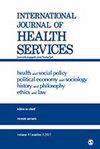COVID-19疫苗延迟获得:从非洲低收入国家的角度看
IF 3.4
4区 医学
Q1 HEALTH CARE SCIENCES & SERVICES
引用次数: 10
摘要
新冠肺炎疫苗的开发是当前遏制新型SARS-CoV-2引起的全球大流行努力的里程碑。因此,疫苗的推广和接种运动在全球范围内继续稳步进展。然而,“倾斜”的推广,或者特别是非洲低收入国家在获得疫苗方面遇到的不公平或延迟,仍然是一个令人严重关切的问题。这可能会对非洲大陆产生负面影响,并可能导致传播增加、旅行限制、经济进一步中断以及发病率和死亡率增加。最终,这些负面后果可能直接或间接阻碍全球战胜疫情的努力。获得新冠肺炎疫苗是全球优先事项,为控制疫情提供了希望。高收入国家、国家政府、捐助机构和其他相关利益攸关方必须支持世界卫生组织的COVAX倡议,以确保向各国公平、快速和公平地分配疫苗,无论收入水平如何。这一努力将迅速控制疫情,并影响全球经济的复苏。非洲低收入国家必须在研究、医疗保健、疫苗和药物开发方面进行大量投资,并必须积极应对未来的流行病。本次审查以非洲为重点,审查新冠肺炎疫苗的推出情况。本文章由计算机程序翻译,如有差异,请以英文原文为准。
Delayed Access to COVID-19 Vaccines: A Perspective on Low-income Countries in Africa
The development of COVID-19 vaccines was a landmark in the current efforts to contain the global pandemic caused by the novel SARS-CoV-2. Consequently, vaccine rollout and inoculation campaigns continue to progress steadily across the globe. However, “skewed” rollout, or the inequitable or delayed access to the vaccines encountered particularly by low-income countries in Africa, remains a source of great concern. This may negatively affect the continent and could lead to increased transmission, travel restrictions, further economic disruptions, and increased morbidity and mortality. Ultimately, these negative consequences could directly or indirectly hamper global efforts to defeat the pandemic. Access to COVID-19 vaccines is a global priority and provides a source of hope to bring the pandemic under control. High-income nations, national governments, donor agencies, and other relevant stakeholders must support the World Health Organization's COVAX initiative to ensure fair, rapid and equitable distribution of the vaccines to countries, irrespective of income level. This effort will rapidly bring the pandemic under control and impact the recovery of the global economy. Low-income nations in Africa must significantly invest in research, health care, vaccines, and drug development and must remain proactive in preparing against future pandemics. This review examines the rollout of the COVID-19 vaccines with a focus on Africa.
求助全文
通过发布文献求助,成功后即可免费获取论文全文。
去求助
来源期刊
CiteScore
4.50
自引率
2.90%
发文量
41
审稿时长
>12 weeks
期刊介绍:
The International Journal of Health Services is a peer-reviewed journal that contains articles on health and social policy, political economy and sociology, history and philosophy, ethics and law in the areas of health and well-being. This journal is a member of the Committee on Publication Ethics (COPE).

 求助内容:
求助内容: 应助结果提醒方式:
应助结果提醒方式:


